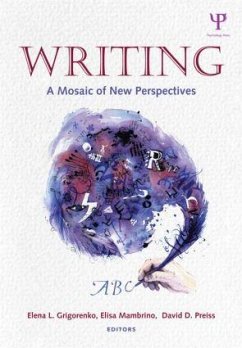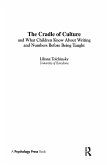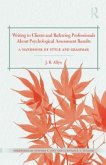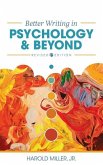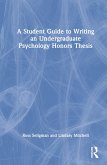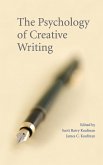Writing
A Mosaic of New Perspectives
Herausgeber: Grigorenko, Elena L.; Preiss, David D.; Mambrino, Elisa
Writing
A Mosaic of New Perspectives
Herausgeber: Grigorenko, Elena L.; Preiss, David D.; Mambrino, Elisa
- Gebundenes Buch
- Merkliste
- Auf die Merkliste
- Bewerten Bewerten
- Teilen
- Produkt teilen
- Produkterinnerung
- Produkterinnerung
This book captures the diversity and richness of writing as it relates to different forms of abilities, skills, competencies, and expertise. Psychologists, educators, researchers, and practitioners in neighboring areas are interested in exploring how writing develops and in what manner this development can be fostered, but they lack a handy, unified, and comprehensive source of information to satisfy their interest. The goal of this book is to fill this void by reflecting on the phenomenon of writing from a developmental perspective. It contains an integrated set of chapters devoted to issues…mehr
Andere Kunden interessierten sich auch für
![The Cradle of Culture and What Children Know About Writing and Numbers Before Being The Cradle of Culture and What Children Know About Writing and Numbers Before Being]() Liliana TolchinskyThe Cradle of Culture and What Children Know About Writing and Numbers Before Being167,99 €
Liliana TolchinskyThe Cradle of Culture and What Children Know About Writing and Numbers Before Being167,99 €![Writing to Clients and Referring Professionals about Psychological Assessment Results Writing to Clients and Referring Professionals about Psychological Assessment Results]() J. B. AllynWriting to Clients and Referring Professionals about Psychological Assessment Results180,99 €
J. B. AllynWriting to Clients and Referring Professionals about Psychological Assessment Results180,99 €![Better Writing in Psychology and Beyond Better Writing in Psychology and Beyond]() Harold MillerBetter Writing in Psychology and Beyond72,99 €
Harold MillerBetter Writing in Psychology and Beyond72,99 €![The Technique of Fiction Writing The Technique of Fiction Writing]() Robert Saunders DowstThe Technique of Fiction Writing33,99 €
Robert Saunders DowstThe Technique of Fiction Writing33,99 €![A Student Guide to Writing an Undergraduate Psychology Honors Thesis A Student Guide to Writing an Undergraduate Psychology Honors Thesis]() Ross SeligmanA Student Guide to Writing an Undergraduate Psychology Honors Thesis148,99 €
Ross SeligmanA Student Guide to Writing an Undergraduate Psychology Honors Thesis148,99 €![The Psychology of Creative Writing The Psychology of Creative Writing]() Scott Barry KaufmanThe Psychology of Creative Writing127,99 €
Scott Barry KaufmanThe Psychology of Creative Writing127,99 €![Joyce and the Science of Rhythm Joyce and the Science of Rhythm]() W. MartinJoyce and the Science of Rhythm52,99 €
W. MartinJoyce and the Science of Rhythm52,99 €-
-
-
This book captures the diversity and richness of writing as it relates to different forms of abilities, skills, competencies, and expertise. Psychologists, educators, researchers, and practitioners in neighboring areas are interested in exploring how writing develops and in what manner this development can be fostered, but they lack a handy, unified, and comprehensive source of information to satisfy their interest. The goal of this book is to fill this void by reflecting on the phenomenon of writing from a developmental perspective. It contains an integrated set of chapters devoted to issues of writing: how writing develops, how it is and should be taught and how writing paths of development differ across writing genres. Specifically, the book addresses typologies of writing; pathways of the development of writing skills; stages of the development of writing; individual differences in the acquisition of writing skills; writing ability and disability; teaching writing; and the development and demonstration of expertise in writing.
Produktdetails
- Produktdetails
- Verlag: Psychology Press
- Seitenzahl: 506
- Erscheinungstermin: 20. Januar 2012
- Englisch
- Abmessung: 260mm x 183mm x 32mm
- Gewicht: 1137g
- ISBN-13: 9781848728127
- ISBN-10: 1848728123
- Artikelnr.: 34787741
- Herstellerkennzeichnung
- Libri GmbH
- Europaallee 1
- 36244 Bad Hersfeld
- gpsr@libri.de
- Verlag: Psychology Press
- Seitenzahl: 506
- Erscheinungstermin: 20. Januar 2012
- Englisch
- Abmessung: 260mm x 183mm x 32mm
- Gewicht: 1137g
- ISBN-13: 9781848728127
- ISBN-10: 1848728123
- Artikelnr.: 34787741
- Herstellerkennzeichnung
- Libri GmbH
- Europaallee 1
- 36244 Bad Hersfeld
- gpsr@libri.de
Dr. Elena L. Grigorenko received her Ph.D. in general psychology from Moscow State University, Russia, and her Ph.D. in developmental psychology and genetics from Yale University, USA. Currently, Dr. Grigorenko is an Associate Professor of Child Studies, Psychology, and Epidemiology and Public Health at Yale, and Adjunct Professor of Psychology at Columbia University and Moscow State University (Russia). Dr. Grigorenko has published more than 300 peer-reviewed articles, book chapters, and books. She has received multiple professional awards for her work and received funding for her research from the NIH, NSF, DOE, USAID, Cure Autism Now, the Foundation for Child Development, the American Psychological Foundation, and other federal and private sponsoring organizations. Dr. Elisa Mambrino is a licensed psychologist who received her Ph.D. in School Psychology from Columbia University Teachers College. In the course of this doctoral program, which is accredited by the American Psychological Association (APA), Dr. Mambrino completed an APA-accredited Pre-doctoral Internship in Clinical Neuropsychology and Rehabilitation Psychology at Mount Sinai Hospital and Mount Sinai School of Medicine. She then completed both the Marie Kessel Postdoctoral Fellowship at the Columbia University College of Physicians and Surgeons and a Postdoctoral Fellowship at the Yale University School of Medicine's Child Study Center. Dr. Mambrino also has a Master of Science degree from the Columbia University Graduate School of Journalism. Dr. David D. Preiss is an Associate Professor at the Escuela de Psicologia of the Pontificia Universidad Catolica de Chile. He received his Ph.D. in cognitive psychology from Yale University, which he attended as a Fulbright Scholar. At the Pontificia Universidad Católica de Chile, he is affiliated with the Measurement Center MIDE UC and the Center for Research on Educational Policy and Practice. His research includes topics such as culture and instruction, creativity and writing processes, and the cognitive consequences of technology. He co-edited with Robert J. Sternberg Intelligence and Technology: The Impact of Tools on the Nature and Development of Human Abilities (Erlbaum, 2005) and Innovations in Educational Psychology: Perspectives in Teaching, Learning and Human Development (Springer Publishing Company, 2010). David Preiss' research initiatives have been funded by diverse grants from agencies and programs such as FONDECYT, FONDAP, FONDEF, FONIDE and Fundación Andes.
D.D. Preiss
E. Mambrino
E.L. Grigorenko
Preface. Part 1. The Origins of Writing. D. Schmandt-Besserat
Tokens as Precursors of Writing. A. Lock
M. Gers
The Cultural Evolution of Written Language and Its Effects: A Darwinian Process from Prehistory to The Modern Day. D. Olson
Language
Literacy and Mind: The Literacy Hypothesis. Part 2. Writing and Human Development. J. Zins
S.R. Hooper
The Inter-Relationship of Child Development and Written Language Development. V.W. Berninger
L. Chanqouy
What Writing Is and How It Changes Across Early and Middle Childhood Development: A Multi-Disciplinary Perspective. T.L. Richards
V.W. Berninger
M. Fayol
The Writing Brain of Normal Child Writers and Children with Writing Disabilities: Generating Ideas and Transcribing Them through the Orthographic Loop. Part 3. Working Memory and Expertise in Writing. R.T. Kellogg
A.P. Whiteford
The Development of Writing Expertise. T. Olive
Writing and Working Memory: A Summary of Theories and Findings. M. Fayol
J.N. Foulin
S. Maggio
B. Lété
Towards a Dynamic Approach of How Children and Adults Manage Text Production. D.L. Coker
Jr.
Descriptive Writing. Part 4. The Teaching of Writing. M. Chuy
M. Scardamalia
C. Bereiter
Development of Writing through Knowledge Building: Theoretical and Empirical Bases. J. Randi
T. Newman
L. Jarvin
Creative Writing as Assessment of Content. C.R. Fallahi
Improving the Writing Skills of College Students. J.S. Hedgcock
Second Language Writing Processes Among Adolescent and Adult Learners. Part 5. Creativity and Emotions in Writing. J. Piirto
Themes in the Lives of Creative Writers. J.C. Kaufman
J.D. Sexton
A.E. White
The Creative Writer and Mental Health: The Importance of Domains and Style. M. Tan
J. Randi
B. Barbot
C. Levenson
L. Friedlaender
E.L. Grigorenko
Seeing
Connecting
Writing: Developing Creativity and Narrative Writing in Children. P. Smagorinsky
E.A. Daigle
The Role of Affect in Students' Writing for School. Part 6. Disorder of Written Language: Diagnostic Criteria
Prevalence
and Biological Bases. A. Ardila
Neuropsychology of Writing. E. Mambrino
Written Expression's Neuropsychological Nexus (WENN): A Working Clinical Theory. J. Reich
E.L. Grigorenko
The Effect of Language and Orthography On Writing Disabilities and the Necessity for Cross-Linguistic Research. M. Leung
S. Law. R. Fung
H. Lui
B.S. Weekes
A Model of Writing Chinese Characters: Data From Acquired Dysgraphia and Writing Development. Part 7. The Diagnosis and Assessment of Writing as a Skill and a Competence. J. Lee
L. Stankov
Large-Scale Writing Assessment: New Approaches Adopted In the National Assessment of Educational Progress (NAEP). J. Manzi
P. Flotts
D.D. Preiss
Design of a College-Level Test of Written Communication: Theoretical and Methodological Challenges. Part 8. Testimonials. R. Couch
Burning Down the House: Ethics and Reception in Poetry Translation. J. Felstiner
Bringing Redemption to the World: A Translation Sampler. A. Jeftanovic
A Narrator's Testimony Between Reading
Writing
and Displacements. G.J. Rose
The Story Behind My Being A Writer. R.J. Sternberg
Twelve Hundred Publications Later: Reflections on a Career of Writing in Psychology.
E. Mambrino
E.L. Grigorenko
Preface. Part 1. The Origins of Writing. D. Schmandt-Besserat
Tokens as Precursors of Writing. A. Lock
M. Gers
The Cultural Evolution of Written Language and Its Effects: A Darwinian Process from Prehistory to The Modern Day. D. Olson
Language
Literacy and Mind: The Literacy Hypothesis. Part 2. Writing and Human Development. J. Zins
S.R. Hooper
The Inter-Relationship of Child Development and Written Language Development. V.W. Berninger
L. Chanqouy
What Writing Is and How It Changes Across Early and Middle Childhood Development: A Multi-Disciplinary Perspective. T.L. Richards
V.W. Berninger
M. Fayol
The Writing Brain of Normal Child Writers and Children with Writing Disabilities: Generating Ideas and Transcribing Them through the Orthographic Loop. Part 3. Working Memory and Expertise in Writing. R.T. Kellogg
A.P. Whiteford
The Development of Writing Expertise. T. Olive
Writing and Working Memory: A Summary of Theories and Findings. M. Fayol
J.N. Foulin
S. Maggio
B. Lété
Towards a Dynamic Approach of How Children and Adults Manage Text Production. D.L. Coker
Jr.
Descriptive Writing. Part 4. The Teaching of Writing. M. Chuy
M. Scardamalia
C. Bereiter
Development of Writing through Knowledge Building: Theoretical and Empirical Bases. J. Randi
T. Newman
L. Jarvin
Creative Writing as Assessment of Content. C.R. Fallahi
Improving the Writing Skills of College Students. J.S. Hedgcock
Second Language Writing Processes Among Adolescent and Adult Learners. Part 5. Creativity and Emotions in Writing. J. Piirto
Themes in the Lives of Creative Writers. J.C. Kaufman
J.D. Sexton
A.E. White
The Creative Writer and Mental Health: The Importance of Domains and Style. M. Tan
J. Randi
B. Barbot
C. Levenson
L. Friedlaender
E.L. Grigorenko
Seeing
Connecting
Writing: Developing Creativity and Narrative Writing in Children. P. Smagorinsky
E.A. Daigle
The Role of Affect in Students' Writing for School. Part 6. Disorder of Written Language: Diagnostic Criteria
Prevalence
and Biological Bases. A. Ardila
Neuropsychology of Writing. E. Mambrino
Written Expression's Neuropsychological Nexus (WENN): A Working Clinical Theory. J. Reich
E.L. Grigorenko
The Effect of Language and Orthography On Writing Disabilities and the Necessity for Cross-Linguistic Research. M. Leung
S. Law. R. Fung
H. Lui
B.S. Weekes
A Model of Writing Chinese Characters: Data From Acquired Dysgraphia and Writing Development. Part 7. The Diagnosis and Assessment of Writing as a Skill and a Competence. J. Lee
L. Stankov
Large-Scale Writing Assessment: New Approaches Adopted In the National Assessment of Educational Progress (NAEP). J. Manzi
P. Flotts
D.D. Preiss
Design of a College-Level Test of Written Communication: Theoretical and Methodological Challenges. Part 8. Testimonials. R. Couch
Burning Down the House: Ethics and Reception in Poetry Translation. J. Felstiner
Bringing Redemption to the World: A Translation Sampler. A. Jeftanovic
A Narrator's Testimony Between Reading
Writing
and Displacements. G.J. Rose
The Story Behind My Being A Writer. R.J. Sternberg
Twelve Hundred Publications Later: Reflections on a Career of Writing in Psychology.
D.D. Preiss
E. Mambrino
E.L. Grigorenko
Preface. Part 1. The Origins of Writing. D. Schmandt-Besserat
Tokens as Precursors of Writing. A. Lock
M. Gers
The Cultural Evolution of Written Language and Its Effects: A Darwinian Process from Prehistory to The Modern Day. D. Olson
Language
Literacy and Mind: The Literacy Hypothesis. Part 2. Writing and Human Development. J. Zins
S.R. Hooper
The Inter-Relationship of Child Development and Written Language Development. V.W. Berninger
L. Chanqouy
What Writing Is and How It Changes Across Early and Middle Childhood Development: A Multi-Disciplinary Perspective. T.L. Richards
V.W. Berninger
M. Fayol
The Writing Brain of Normal Child Writers and Children with Writing Disabilities: Generating Ideas and Transcribing Them through the Orthographic Loop. Part 3. Working Memory and Expertise in Writing. R.T. Kellogg
A.P. Whiteford
The Development of Writing Expertise. T. Olive
Writing and Working Memory: A Summary of Theories and Findings. M. Fayol
J.N. Foulin
S. Maggio
B. Lété
Towards a Dynamic Approach of How Children and Adults Manage Text Production. D.L. Coker
Jr.
Descriptive Writing. Part 4. The Teaching of Writing. M. Chuy
M. Scardamalia
C. Bereiter
Development of Writing through Knowledge Building: Theoretical and Empirical Bases. J. Randi
T. Newman
L. Jarvin
Creative Writing as Assessment of Content. C.R. Fallahi
Improving the Writing Skills of College Students. J.S. Hedgcock
Second Language Writing Processes Among Adolescent and Adult Learners. Part 5. Creativity and Emotions in Writing. J. Piirto
Themes in the Lives of Creative Writers. J.C. Kaufman
J.D. Sexton
A.E. White
The Creative Writer and Mental Health: The Importance of Domains and Style. M. Tan
J. Randi
B. Barbot
C. Levenson
L. Friedlaender
E.L. Grigorenko
Seeing
Connecting
Writing: Developing Creativity and Narrative Writing in Children. P. Smagorinsky
E.A. Daigle
The Role of Affect in Students' Writing for School. Part 6. Disorder of Written Language: Diagnostic Criteria
Prevalence
and Biological Bases. A. Ardila
Neuropsychology of Writing. E. Mambrino
Written Expression's Neuropsychological Nexus (WENN): A Working Clinical Theory. J. Reich
E.L. Grigorenko
The Effect of Language and Orthography On Writing Disabilities and the Necessity for Cross-Linguistic Research. M. Leung
S. Law. R. Fung
H. Lui
B.S. Weekes
A Model of Writing Chinese Characters: Data From Acquired Dysgraphia and Writing Development. Part 7. The Diagnosis and Assessment of Writing as a Skill and a Competence. J. Lee
L. Stankov
Large-Scale Writing Assessment: New Approaches Adopted In the National Assessment of Educational Progress (NAEP). J. Manzi
P. Flotts
D.D. Preiss
Design of a College-Level Test of Written Communication: Theoretical and Methodological Challenges. Part 8. Testimonials. R. Couch
Burning Down the House: Ethics and Reception in Poetry Translation. J. Felstiner
Bringing Redemption to the World: A Translation Sampler. A. Jeftanovic
A Narrator's Testimony Between Reading
Writing
and Displacements. G.J. Rose
The Story Behind My Being A Writer. R.J. Sternberg
Twelve Hundred Publications Later: Reflections on a Career of Writing in Psychology.
E. Mambrino
E.L. Grigorenko
Preface. Part 1. The Origins of Writing. D. Schmandt-Besserat
Tokens as Precursors of Writing. A. Lock
M. Gers
The Cultural Evolution of Written Language and Its Effects: A Darwinian Process from Prehistory to The Modern Day. D. Olson
Language
Literacy and Mind: The Literacy Hypothesis. Part 2. Writing and Human Development. J. Zins
S.R. Hooper
The Inter-Relationship of Child Development and Written Language Development. V.W. Berninger
L. Chanqouy
What Writing Is and How It Changes Across Early and Middle Childhood Development: A Multi-Disciplinary Perspective. T.L. Richards
V.W. Berninger
M. Fayol
The Writing Brain of Normal Child Writers and Children with Writing Disabilities: Generating Ideas and Transcribing Them through the Orthographic Loop. Part 3. Working Memory and Expertise in Writing. R.T. Kellogg
A.P. Whiteford
The Development of Writing Expertise. T. Olive
Writing and Working Memory: A Summary of Theories and Findings. M. Fayol
J.N. Foulin
S. Maggio
B. Lété
Towards a Dynamic Approach of How Children and Adults Manage Text Production. D.L. Coker
Jr.
Descriptive Writing. Part 4. The Teaching of Writing. M. Chuy
M. Scardamalia
C. Bereiter
Development of Writing through Knowledge Building: Theoretical and Empirical Bases. J. Randi
T. Newman
L. Jarvin
Creative Writing as Assessment of Content. C.R. Fallahi
Improving the Writing Skills of College Students. J.S. Hedgcock
Second Language Writing Processes Among Adolescent and Adult Learners. Part 5. Creativity and Emotions in Writing. J. Piirto
Themes in the Lives of Creative Writers. J.C. Kaufman
J.D. Sexton
A.E. White
The Creative Writer and Mental Health: The Importance of Domains and Style. M. Tan
J. Randi
B. Barbot
C. Levenson
L. Friedlaender
E.L. Grigorenko
Seeing
Connecting
Writing: Developing Creativity and Narrative Writing in Children. P. Smagorinsky
E.A. Daigle
The Role of Affect in Students' Writing for School. Part 6. Disorder of Written Language: Diagnostic Criteria
Prevalence
and Biological Bases. A. Ardila
Neuropsychology of Writing. E. Mambrino
Written Expression's Neuropsychological Nexus (WENN): A Working Clinical Theory. J. Reich
E.L. Grigorenko
The Effect of Language and Orthography On Writing Disabilities and the Necessity for Cross-Linguistic Research. M. Leung
S. Law. R. Fung
H. Lui
B.S. Weekes
A Model of Writing Chinese Characters: Data From Acquired Dysgraphia and Writing Development. Part 7. The Diagnosis and Assessment of Writing as a Skill and a Competence. J. Lee
L. Stankov
Large-Scale Writing Assessment: New Approaches Adopted In the National Assessment of Educational Progress (NAEP). J. Manzi
P. Flotts
D.D. Preiss
Design of a College-Level Test of Written Communication: Theoretical and Methodological Challenges. Part 8. Testimonials. R. Couch
Burning Down the House: Ethics and Reception in Poetry Translation. J. Felstiner
Bringing Redemption to the World: A Translation Sampler. A. Jeftanovic
A Narrator's Testimony Between Reading
Writing
and Displacements. G.J. Rose
The Story Behind My Being A Writer. R.J. Sternberg
Twelve Hundred Publications Later: Reflections on a Career of Writing in Psychology.

